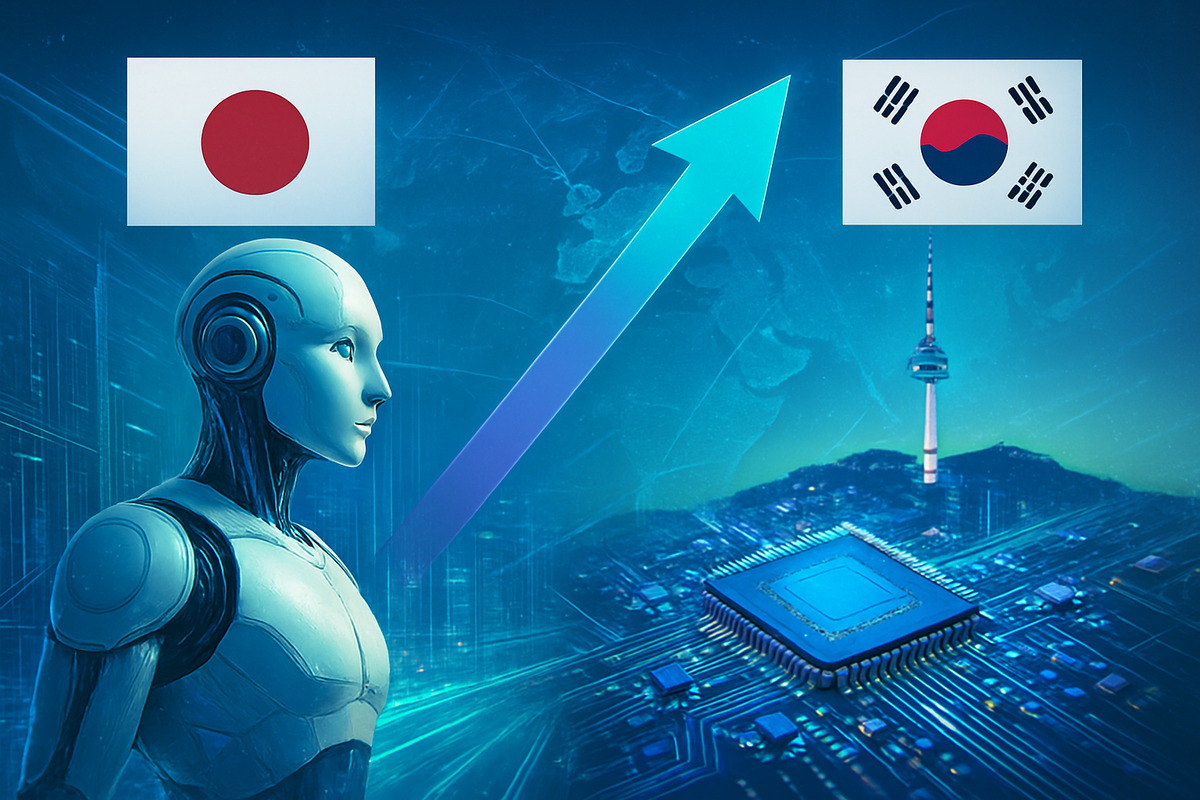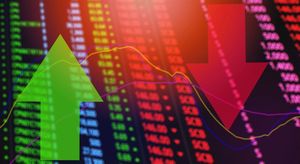
The Asian technology sector is experiencing a significant and timely rebound in early November 2025, with Japan and South Korea emerging at the forefront of these gains. This resurgence follows a period of market volatility driven by concerns over artificial intelligence (AI)-fueled valuations, but now signals a renewed and robust investor appetite for technology stocks across the region. The swift recovery, particularly evident in leading chipmakers and digital innovators, suggests that market participants are actively "buying the dip" and re-evaluating the long-term growth prospects of these tech powerhouses.
This rebound is more than just a fleeting market correction; it indicates a fundamental shift in investor sentiment, recognizing the strategic importance of Asian tech firms in the global digital economy. As of November 10, 2025, markets in both Japan and South Korea have demonstrated strong performance, with technology shares leading the charge, hinting at a sustained period of growth and innovation for the sector.
Detailed Coverage: A Rapid Recovery and Key Market Drivers
The Asian tech sector's rebound has been both swift and decisive, unfolding immediately around the current date of November 9, 2025. Following a sharp downturn in early November—with Japan's Nikkei 225 (TYO: ^N225) dropping over 4% and South Korea's KOSPI (KOSPI: ^KOSPI) plunging more than 5% on November 5, 2025, due to global AI bubble fears—a significant recovery began almost immediately. By Monday, November 10, 2025, both indices were standout performers among Asian stocks, rising by 1.2% and 2.8% respectively, primarily propelled by technology shares.
Key players have been instrumental in driving these gains. In South Korea, semiconductor giants SK Hynix Inc. (KOSPI: 000660) and Samsung Electronics Co. Ltd. (KOSPI: 005930) saw substantial jumps of 5% and 2.3% on November 10, 2025. Earlier in the month, SK Hynix surged 11% and Samsung Electronics climbed 3.3% after new AI deals involving Nvidia (NASDAQ: NVDA) in South Korea, underscoring the critical role of AI in this rally. The KOSPI index itself had enjoyed a nearly 12% surge in October, largely on the back of these chipmakers amid a global AI-driven memory-chip boom.
Japan's tech firms also contributed significantly to the rebound. Advantest Corp. (TYO: 6857) and Tokyo Electron Ltd. (TYO: 8035), both crucial manufacturers of semiconductor testing and production equipment, added 3.9% and 4.3% to their shares, respectively, on November 10, 2025. Japanese e-commerce firm Mercari Inc. (TYO: 4385) notably soared over 10% after reporting strong quarterly earnings, becoming a top performer on the Nikkei 225. This robust performance follows a strong October for the Nikkei 225, which saw a 16.64% increase, marking its largest monthly gain in 35 years.
American investors are increasingly channeling funds into the Japanese tech and AI sectors at the fastest rate since the "Abenomics" era, suggesting a potential shift from value to growth stocks. While the earlier downturn raised doubts over "AI-fueled valuations," analysts largely view it as "natural profit-taking" after a strong rally, rather than a fundamental flight of capital. The ongoing rebound, therefore, reflects renewed confidence and a strategic repositioning by investors.
Companies Poised for Gains and Facing Headwinds
The recent tech sector rebound in Asia, centered around November 2025, is creating clear winners and losers among public companies in Japan and South Korea, primarily driven by the escalating demand for AI chips and strategic positioning within the semiconductor value chain.
Clear Winners in the Rebound:
In South Korea, Samsung Electronics (KOSPI: 005930), a global leader in semiconductors and mobile devices, is a major beneficiary. Its semiconductor division is thriving from increased demand for memory chips, especially its crucial High Bandwidth Memory (HBM) for AI. Similarly, SK Hynix (KOSPI: 000660), the world's second-largest memory chip manufacturer, has seen its stock surge due to strong ties with Nvidia and its leadership in HBM solutions, achieving record performance in 2024. Kakao (KOSPI: 035720), operator of South Korea's super app, also jumped following a strategic alliance with OpenAI, strengthening its market position and fostering innovation.
In Japan, SoftBank Group (TYO: 9984) is rallying strongly, driven by its substantial investments in AI, including plans to invest in OpenAI and build AI infrastructure. Advantest (TYO: 6857) and Tokyo Electron (TYO: 8035), both critical suppliers of semiconductor testing and production equipment, have seen their stocks climb significantly, directly benefiting from the AI boom and increased global demand for chips. E-commerce giant Mercari Inc. (TYO: 4385) also soared over 10% after reporting robust quarterly earnings, showcasing strong individual company performance within the broader tech upswing.
Companies Facing Challenges or Potential Losses:
While the overall sentiment is positive, some companies may face headwinds. In South Korea, Naver (KOSPI: 035420), the dominant internet portal, experienced declines amidst broader tech sector corrections and concerns over high valuations in certain internet stocks, despite its long-term AI investment plans. In Japan, companies like Nidec (TYO: 6594), a global motor manufacturer, saw its stock slide after pulling its outlook, indicating vulnerability to broader economic factors outside the core AI/semiconductor boom. Furthermore, traditional Japanese IT firms heavily reliant on legacy systems face significant risks, with a looming "2025 Digital Cliff" potentially leading to substantial economic losses if they fail to modernize. Companies perceived as not maximizing shareholder returns, such as Keyence (TYO: 6861) and Nintendo (TYO: 7974), despite their profitability, are also facing increasing investor scrutiny over large cash piles.
Wider Significance: A New Era of Tech Leadership and Global Realignment
The Asian tech sector rebound, particularly in Japan and South Korea around November 2025, signifies more than just market recovery; it marks a new era of technological leadership and global realignment. This resurgence is deeply intertwined with broader industry trends, creating ripple effects across global supply chains, intensifying competition, and reshaping international partnerships.
The overarching trend driving this rebound is the pervasive integration and demand for Artificial Intelligence. AI is not merely a product but a fundamental catalyst, driving a new technology cycle that necessitates massive corporate investments in high-performance computing and memory solutions like HBM. This demand fuels the growth of companies like SK Hynix and Samsung, solidifying South Korea's position as a critical node in global AI infrastructure. Simultaneously, Japan is making a strategic comeback in the semiconductor sector, backed by substantial government subsidies and partnerships, exemplified by Rapidus's collaboration with IBM to produce cutting-edge 2-nanometer chips.
These developments have profound ripple effects on competitors and partners. The ongoing US-China tech rivalry continues to reshape global tech supply chains, with US policies pushing for diversification away from China. This benefits stable, advanced manufacturing hubs like Japan and South Korea, which are becoming crucial alternative sources for critical components. Furthermore, the United States is actively forging deeper "Technology Prosperity Deals" with both nations, signed in late October and early November 2025. These agreements aim to expand alliances in critical areas like AI, quantum computing, and 6G networks, fostering collaboration on research, aligning technology standards, and strengthening supply chain resilience.
Regulatory and policy implications are also significant. Both Japan and South Korea are implementing robust industrial policies to support their tech sectors. Japan's ¥10 trillion commitment to AI and chips and South Korea's over $12 billion investment in emerging technologies highlight proactive government strategies. These policies, coupled with international alignments on standards and security through deals like the US CHIPS Act, aim to ensure national competitiveness and supply chain stability amidst a complex geopolitical landscape.
Historically, the technology sector has experienced boom-and-bust cycles. However, analysts suggest the current upswing, particularly in 2024-2025, is distinct. It is driven by rapid earnings growth in tech companies and propelled by emerging megatrends such as AI, IoT, electric vehicles, and renewable energies, indicating a fundamental shift rather than a transient speculative bubble. This rebound, therefore, is not just a recovery but a re-establishment of Asia's crucial role in the next wave of global technological innovation.
What Comes Next: Charting the Future of Asian Tech Dominance
The Asian tech sector's rebound, firmly established around November 9, 2025, sets the stage for a dynamic future, marked by both immense opportunities and significant challenges for Japan and South Korea. The short-term momentum is expected to transition into long-term strategic growth, albeit with necessary adaptations.
In the short-term, both nations will see continued acceleration in domestic digitalization and AI adoption. Japan is urgently addressing its "2025 Digital Cliff" to avoid substantial economic losses from outdated systems, propelling investments in IT services, software, and AI analytics. South Korea's markets will continue to be driven by robust demand for AI and memory chips, with significant government expenditure planned for AI, including the procurement of high-performance GPUs. This immediate future is characterized by rapid innovation and intense competition to capitalize on the AI boom.
Looking at the long-term, Japan aims to solidify its position as a leader in critical technologies, with ¥10 trillion in subsidies for semiconductors and extensive investments in AI, biotechnology, and supercomputing (including a "zeta-class" supercomputer by 2030). South Korea is equally ambitious, striving to be a top 3 global AI nation by 2030, backed by a KRW 340 trillion semiconductor mega-cluster by 2042 and leadership in 6G telecommunications. Both countries foresee sustained growth in industrial robotics, IoT, and advanced digital transformation markets.
However, these ambitions require strategic pivots and adaptations. Japan faces a critical shortage of IT professionals (an estimated 220,000 by 2025) and must overcome entrenched legacy systems and risk aversion. Upskilling the existing workforce and fostering a culture of innovation and global collaboration are paramount. South Korea, while a global leader, must sustain its innovation edge against fierce competition, navigate complex data protection and cybersecurity regulations, and reduce its reliance on the Chinese market due to ongoing trade tensions. Both nations need to continuously invest in talent development, especially in interdisciplinary fields.
Market opportunities are vast, ranging from significant growth in IT services, AI-driven solutions in healthcare and manufacturing, to burgeoning fintech, healthtech, and insurtech sectors. For South Korea, leading positions in semiconductors, displays, and investments in rechargeable batteries and future vehicles present lucrative avenues. Challenges include intense global competition, regulatory hurdles for foreign companies, and the need to integrate cutting-edge solutions with existing legacy infrastructure. Data privacy and cybersecurity remain critical concerns for all players.
Potential scenarios range from a positive outcome, where both nations successfully leverage government initiatives and R&D investments to achieve sustained growth and global leadership, to a challenging scenario, where external factors like geopolitical tensions or internal issues like talent gaps and slow digital adoption hinder momentum, leading to a fragmented rebound. A moderate scenario would see gradual progress with benefits concentrated in highly prioritized sectors. The most likely path involves a dynamic interplay of these factors, requiring continuous adaptation and strategic foresight.
Wrap-up: Sustaining Momentum in a Transformed Market
The Asian tech sector's rebound, spearheaded by Japan and South Korea in early November 2025, marks a pivotal moment for global financial markets. The swift recovery from AI valuation concerns, coupled with robust gains in technology shares, underscores the enduring appeal and strategic importance of these nations in the evolving digital landscape. This event is not merely a market correction but a reaffirmation of the fundamental strengths and innovative capacities within the region's tech ecosystem.
The key takeaway is that the global demand for AI and advanced semiconductors is a powerful, long-term driver that continues to fuel growth, transforming market dynamics and investor sentiment. Japan and South Korea, with their proactive government support, significant R&D investments, and leading positions in critical technologies, are well-positioned to capitalize on this megatrend. However, their success will hinge on effectively addressing challenges such as talent shortages, legacy system modernization, and navigating complex geopolitical and regulatory environments.
Moving forward, investors should closely watch several indicators. The performance of key semiconductor players like Samsung Electronics (KOSPI: 005930) and SK Hynix (KOSPI: 000660) will remain crucial barometers of the sector's health. Additionally, monitoring government policies and subsidies in both Japan and South Korea, particularly those related to AI, 5G/6G, and advanced manufacturing, will provide insights into future growth trajectories. The success of digital transformation initiatives in Japan and the expansion of South Korea's semiconductor mega-cluster will also be critical long-term indicators. The Asian tech market, having demonstrated its resilience and innovative spirit, is set for a period of sustained evolution and strategic importance in the coming months and years.
This content is intended for informational purposes only and is not financial advice.





